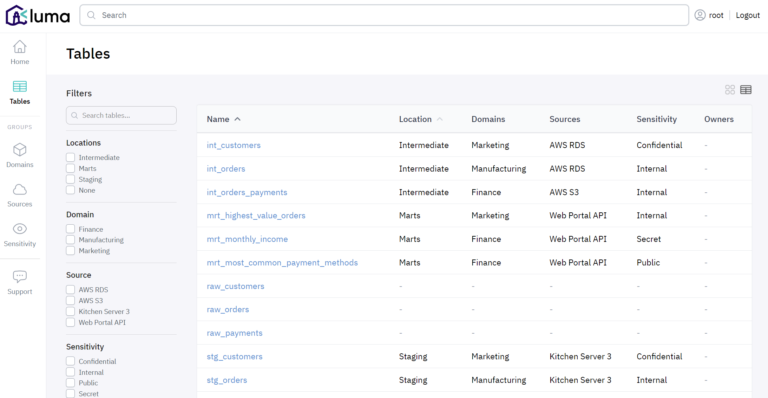luma Data Catalog.
OUR DATA CATALOG.
Designed for Your Needs.

luma is the cutting-edge data catalog solution that empowers your organization to seamlessly locate, validate, and harness the power of your data.

luma Data Catalog Features

Effortless Metadata Management
Take your analytics department to the next level with luma’s effortless metadata ingestion. Our platform allows seamless integration of metadata directly from your data pipelines into luma’s data catalog, aligning perfectly with your existing infrastructure. Our team of industry experts is dedicated to ensuring the data catalog fulfills all your technical and business needs, working alongside your team at all times.

Efficient Data Discovery
luma’s powerful search capabilities will allow your team to quickly locate and assess the reliability of data within your organisation. This capability will allow your executives and team members access reliable real-time data that they can depend on, empowering them with the critical data to make key business decisions.

Improved Collaboration
luma fosters collaboration by connecting users to data experts within your organisation. You will be able to easily identify who is responsible for specific data sets, and streamline communication to improve decision-making and data accuracy, helping your analytics department make an impact organization wide.

Documentation by Design
Outdated data is a thing of the past with luma’s continuous refresh capabilities. Keep your organisation’s data catalog up-to-date and avoid the pitfalls of obsolete information. With luma, you will have constant access to real-time data, ensuring your analytics stands out in terms of efficiency and reliability.
Benefits of the luma Data Catalog
Increased Collaboration
Make data analytics and science easier for everyone in your organization with luma, with your data analytics team becoming your internal powerhouse. Work together, innovate, and achieve more. Gain a clear understanding of your organisation’s data assets, empowering you to make informed decisions and drive business success.

Accelerated Discoverability
Eliminate wasted time and effort searching for data. Our data catalog empowers each and every member of your team to find the information they need with speed and precision, driving efficiency & effectiveness across your organisation.

Streamlined Governance
Simplify data access and ownership control with our data catalog’s robust governance features. We work with you to establish clear protocols and processes to ensure your organisation’s data remains secure and compliant.

Uncompromised Data Quality
You will have full confidence in the quality of your data with our data catalog’s in-depth test tracking and reporting capabilities. You will be able to review test results, monitor data quality, and ensure your organization’s data assets remain accurate and reliable.

Drive Cost-Efficiencies
Spot underutilized resources, enhance your reporting process, and drive significant cost savings with luma.


Ready to Transform Your Data Organization?
Get started with luma today and unlock the full potential of your organisation’s data. Contact our team of experts for a personalised demo and experience the future of data management.
Frequently asked Questions
We already have a data catalog in place, how will you manage that transition?
Together, we will conduct a thorough analysis of the current solution, identifying areas of improvement or gaps. Our aim is to develop a comprehensive transformation plan including technology, processes, and people. Recognizing the limitations of the existing solution is vital as it enables us to tailor luma more effectively to meet your specific requirements.
How does luma integrate with our existing data infrastructure?
luma seamlessly accepts data through a REST API, with our luma CLI, a robust command-line tool, being used to transmit metadata to the API. We enhance the compatibility with your architecture by employing existing luma CLI connectors or developing new ones. The unique advantage of our CLI tool lies in its broad connectivity potential, enabling it to interface with nearly any system, even accommodating legacy solutions.
Is luma compatible with various Data Pipeline Transformation (DPT) solutions?
luma seamlessly ingests data through REST API calls. Given that most Data Processing and Transformation (DPT) solutions are capable of transmitting metadata via API, luma boasts an inclusive compatibility, readily supporting all such platforms.
How does luma ensure data quality and reliability?
luma actively ingests metadata straight from your data pipelines, ensuring your data remains consistently current. Further strengthening its utility, luma also offers profiling and testing visibility features. This enables users to swiftly identify and address data quality issues, reinforcing the reliability of your analytics department and keeping your data accurately up-to-date.
How does luma facilitate collaboration among team members?
luma promotes transparency by clearly illustrating the data that your teams are generating and overseeing. This clarity significantly simplifies the task for data analysts to locate and access the required data, eliminating the need for generating tickets or seeking out assistance.
What measures does luma take to keep data secure and compliant?
luma effortlessly brings to light compliance and security metadata, thereby simplifying the process of conducting security audits.
How does luma help avoid obsolete data?
luma offers a clear view of essential information, including metrics like last_time_run or tests passed. This transparency facilitates companies in developing audit strategies and policies for ongoing assessment of outdated data. This will also allow your organization to efficiently manage cloud expenses associated with data analytics, ensuring a cost-effective operation.
Can the data catalog only be used by the IT team?
While luma affords the IT team a nuanced level of control, its primary aim is to amplify visibility. We recommend enabling individuals outside the IT department to utilize luma. By promoting self-service, you will be able to effectively reduce the workload on your IT team.
